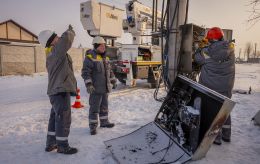British intelligence highlights issues in Russian economy
 Photo: The Central Bank of the Russian Federation raised the rate again
Photo: The Central Bank of the Russian Federation raised the rate again
Russia's economic challenges are expected to worsen in 2025, driven by rising military expenditures and the impact of international sanctions, the UK Ministry of Defence informed on X.
According to the report, on October 25, the Central Bank of Russia (CBR) raised its based interest rate to 21 percent. This is the highest rate since the beginning of Russia's invasion of Ukraine and reflects the CBR's concerns about rising inflationary pressures in the Russian economy.
CBR governor Elvira Nabiullina stated that "more drastic changes" regarding monetary policy might be needed to deal with inflation and get it under control. However, there are cases of growing criticism of the CBR's decision to keep interest rates high from key business executives across multiple Russian industries.
As the UK Defense Intelligence emphasizes, high interest rates in the Russian economy are highly likely to restrict investments and business growth.
Since the war began in 2022, the volume of corporate loans and the proportion of them linked to the CBR's base rate have increased, meaning higher rates now increase debt costs. This has intensified financial pressures on businesses, with corporate bankruptcies in Russia reportedly up 20% in 2024 compared to 2023.
"Inflationary pressures will highly likely continue to intensify in 2025 as government spending is forecast to increase, and labour shortages and pressure from sanctions persist. This will lead to increasing trade-offs between efforts to control inflation and supporting growth of the Russian economy," the UK Ministry of Defence reported.
Russian Central Bank interest rate
Russian Central Bank has recently raised its key interest rate by two percentage points to 21%, the highest since February 2003.
Russian bank cited high inflation expectations, deviations from a balanced growth trajectory, and worsening external trade conditions as primary inflation risks.
The Russian Finance Ministry plans to spend 1.5 trillion rubles (approximately $15.5 billion) more than the budgeted amount for the remaining part of the year, aiming to cover increased military needs.

